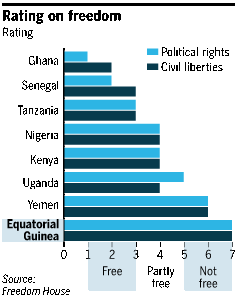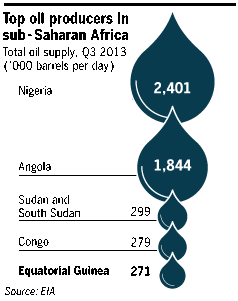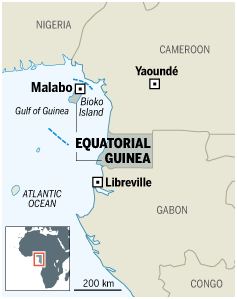Standing nearly five storeys high, the granite headquarters of the Democratic Party of Equatorial Guinea epitomises the power of this small country’s ruling party. A pastiche of Middle East extravagance, false Greek columns and brutalist Soviet style, the building is the new home to the party run by Teodoro Obiang, who has ruled the nation for nearly 35 years with an iron first.
Just a few miles away, the offices of the country’s lone opposition sit in a cracked apartment block in a run- down part of Malabo, the capital. The headquarters of the Convergence for Social Democracy party can be found on the top floor, in an old and dusty two-bedroom flat. Not that it needs much room: the opposition is represented by a single deputy in the 100-strong parliament. His members face constant harassment and often end up in jail for months without charge.
The two buildings offer a vivid illustration of the problems of this tiny oil-rich nation in west Africa. Equatorial Guinea is perhaps the world’s best example of the resource curse: instead of creating prosperity, its oil underpins a dictatorship, fosters corruption and undermines economic development.
Human Rights Watch describes the problem bluntly, saying that “corruption, poverty, and repression continue to plague” the nation. “Vast oil revenues fund lavish lifestyles for the small elite surrounding the president, while most of the population lives in poverty, their basic economic and social rights unmet.”
And yet the country has all the ingredients to be a success in Africa: big oil reserves, low debt, fertile land and a small population of less than 800,000 people. Driven by oil and natural gas production, Equatorial Guinea boasts the highest level of per capita income in all sub-Saharan Africa, at $22,300 per year, or roughly four times more than South Africa and about the same as Portugal, according to the International Monetary Fund. But a good three-quarters of the population live below the poverty line.
Tutu Alicante, of US-based Equatorial Guinea Justice, a campaign group, says the country has two realities. “It has the highest GDP per capita but also the widest gap between rich and poor people.”
The Obiang family and its clan controls all the levers of political power and business. The eldest son of the president, Teodoro Nguema Obiang, known locally as Teodorín, is the vice-president in charge of national security. Another son, Gabriel Mbaga Obiang, runs the oil ministry. The brother of the first lady, Candido Nsue Okomo, is the head of the state-owned oil company GEPetrol.
Foreign diplomats joke that Equatorial Guinea is no more than a secretive family business but one which, as a sovereign country, enjoys a seat at the UN. In the last elections, in 2009, President Obiang won with 95.4 per cent of the votes in a poll that the US said “raised suspicion of systematic voting fraud”. Andrés Esono Ondo, leader of the opposition, says the political and economic situation of the country is bad and “worse, it is moving backwards”.
Press freedom monitors rank it among the world’s 10 worst, along with North Korea. Last month, Equatorial Guinea detained two FT reporters and confiscated a laptop, notebooks and a voice recorder.
The corruption, oppression and mismanagement has not stopped international investors from setting up shop in the country, however. With 270,000 barrels a day of oil produced in 2013, strong natural gas output and the prospect of further hydrocarbon discoveries, the country’s significant investors include the US – by far the largest – along with China, France and Spain, the former colonial power.
The oil rush in Equatorial Guinea started in 1995, after the Zafiro field was brought into production by ExxonMobil, followed soon afterwards by Hess and Marathon, which developed the country’s natural gas reserves. Oil output rose dramatically over the 10 years to 2005, when it hit a record high of 376,000 b/d. By then, Equatorial Guinea was the third-largest oil producer in sub-Saharan Africa, behind only Nigeria and Angola.
But production started to decline after 2005, due in part to the ageing of the Zafiro field but also because of the lack of new discoveries. Foreign oil executives and diplomats also blame mismanagement by GEPetrol, which failed to bring in new companies to explore. The situation changed after the ministry of oil took over responsibility for granting licences from GEPetrol, rebuilding trust with foreign groups. A rush of new contracts, including with commodities giant Glencore and London-listed Ophir, followed. In 2012, after the ministry took over as the main negotiator, it signed nine oil and gas contracts, up from just eight between 2006 and 2011.
Now the country is trying to lure other industries – including fishing, petrochemicals, mining, tourism and financial services – as a way to reduce its dependence on energy. To prime the pump, it has raised a $1bn fund to invest alongside foreign companies.
Equatorial Guinea is holding an investment symposium this week that the government says attracted 241 companies, including construction groups, fishing companies and hospitality groups, from the US, China, Canada, Brazil, the Netherlands, South Africa and Spain. Few observers expect an influx of foreign investors, however. The IMF says the business climate is perceived as “unwelcoming”, a situation that continues to “deter investment in the non-hydrocarbon sector”. Foreign executives largely concur with the assessment.
 There are some positive signs: over the past five years, a burst of public spending – financed with $5bn a year in oil and gas revenues – has triggered a construction boom. The government has rebuilt airports and roads, and improved electricity and water supplies. The spending is noticeable in Malabo, where the roads are no longer the “aged asphalt with repair patches” described in the book Tropical Gangsters: One Man’s Experience With Development And Decadence In Deepest Africa, based on a World Bank consultant’s experiences in the country in the 1980s.
There are some positive signs: over the past five years, a burst of public spending – financed with $5bn a year in oil and gas revenues – has triggered a construction boom. The government has rebuilt airports and roads, and improved electricity and water supplies. The spending is noticeable in Malabo, where the roads are no longer the “aged asphalt with repair patches” described in the book Tropical Gangsters: One Man’s Experience With Development And Decadence In Deepest Africa, based on a World Bank consultant’s experiences in the country in the 1980s.
But the construction boom has negative aspects, too. Opposition activists say it has benefited the local ruling class with lucrative government-funded contracts. And Equatorial Guinea has spent lavishly on “prestige” projects, including conference centres, luxury hotels to host foreign dignitaries and massive six-lane highways hardly used by the local population. The IMF says “costs and wastage have been high”.
Worse, Malabo is spending hundreds of millions of dollars building a new city in the middle of the jungle not far from the birthplace of President Obiang. The city, known as Oyala, could have the capacity to house roughly a quarter of the country’s population, Diplomats say it may become the new capital. The plans for the city, already under construction, include a new presidential palace, a parliament building, an opera house, a cathedral and a five-star hotel with 400 rooms. Photographs of the city show long cuts in the dense rainforest, suggesting wide avenues, along with twin 150-metre suspension bridges crossing the Wele river.
Amid such extravagant construction, education and health services remain underfunded. While the government is spending heavily, little is being invested in ways that would foster long-term development, foreign economists and local activists say.
As a result, the economy is expected to contract this year. Negative growth is an oddity in sub-Saharan Africa, where most economies are growing at 5-10 per cent a year.

As economic clouds gather, the risk of political upheaval is also rising. The main worry among international investors, diplomats and businessmen is the transition from the current rule of President Obiang, who became the country’s president in August 1979 after he deposed his uncle in a bloody coup. After nearly 35 years in power, he is the longest-serving president in Africa, ahead of Robert Mugabe of Zimbabwe and José Eduardo dos Santos of Angola.
In theory he could extend his mandate even further. In 2011 President Obiang won a referendum – which opposition activists and foreign observes said was rigged – to rewrite the constitution. The amended law not only concentrates control in his hands but also allows him to remain in office until 2030, when he would be almost 90 years old and in power for more than half a century.
Few believe he would stay that long. But most observers do not expect him to retire in 2016 when the country holds its next presidential elections. Instead, he could step down in 2019 after 40 years in power.
…
The race to succeed him is well under way. Teodorín is in pole position but faces two obstacles: the antipathy of some members of the ruling family and allegations in the US and France of corruption. Last year France auctioned nine luxury cars it had seized from companies linked to Teodorín, including a Maserati, a Ferrari and a Rolls-Royce, as part of a money-laundering probe. The US Department of Justice has targeted Teodorín in its so-called Kleptocracy Initiative, accusing him of building a $100m fortune through corruption and money-laundering.
US prosecutors in California filed a complaint in December seeking to recover $32m in real estate and personal property – including Michael Jackson memorabilia and a house in Malibu – they claimed Teodorín had bought with funds obtained through “the abuse of public office and illegally laundered”. The complaint alleges Teodorín “exacted millions of dollars in personal payments” as minister of forestry and agriculture “by soliciting and accepting bribes”. The prosecutors allege he “misappropriated, embezzled, and stole hundreds of millions of dollars” of public funds. Teodorín’s lawyers have countered that he has earned his money legally.
It is not the first time that the Obiang family has run into troubles in the US. In the early 2000s authorities exposed the family’s secret accounts at Riggs Bank, which held millions of dollars in a branch located not far from the White House.

If the legal cases prevent Teodorín succeeding his father, another son could have a chance. Gabriel, a minister of oil, is popular with foreign investors but diplomats say he has few supporters internally. Another factor against him is that his mother is not the first lady but Obiang’s second wife, Celestina Lima.
Beyond the two sons, few candidates have emerged. Some fear the transition from President Obiang could be violent in a country with a long history of attempted coups. “We can see a brief but intense burst of violence,” says a government official.
More promising is a younger generation of government officials, mostly educated overseas, that is bringing fresh ideas and a strong desire for change. But their influence is overshadowed by the old guard, known as “crocodiles” by Equatorial Guineans. As with the opposition, cornered in a dusty flat and fighting with no resources, the new generation of officials face an uphill battle.
——————————————-
Civil liberties: Press control earns ‘worst of worst’ status
Press freedom and civil liberties are the areas where Equatorial Guinea ranks among the world’s worst. Freedom House, a democracy and civil rights campaign group that has been publishing rankings for nearly half a century, puts the nation in its top 10 “worst of the worst” list, sitting alongside countries such as North Korea, Syria and Turkmenistan.
Reporters without Borders, a non-profit organisation that defends press freedom, ranks the country as 167th out of 178 countries in its latest index.
Last month armed national security in Equatorial Guinea detained two reporters of the Financial Times for several hours, in spite of their travel visas and official press credentials issued by the country’s ministry of information. National security officials confiscated a laptop, notebooks and a voice recorder. The reporters were allowed to leave the country only after revealing the passwords to the laptop. Their materials have not been returned.
The newspaper protested to the country’s authorities and the Committee to Protect Journalists, a non-profit organisation that often is considered as the Red Cross of journalism. The CPJ has demanded that Malabo return the materials. The detention, which mirrors a similar incident involving the German state-broadcaster ZDF in 2011, illustrates how the old guard that controls the security services and the military keeps a tight control over foreign media, using arbitrary detention and confiscation of equipment.
The US State Department last year said in its annual report on human rights that Equatorial Guinea’s media was “under government influence or control”, adding the “few private media outlets that existed were generally owned by persons close to the president”. Campaigners say that critical privately owned media is virtually non-existent.
Reporters without Borders has accused the country in the past of using high-profile events, such as hosting the African Union summit in mid-2011, to repair its image. Malabo, the capital, will hold another AU summit this year.
The country, a former Spanish colony, routinely blocks access to Spanish-language online newspapers, particularly El País. But satellite television is widely available across Malabo.
——————————————-
Letter in response to this article:
Keep telling the truth about Africa and corruption / From Dr Adam Sneyd
Source link : https://www.ft.com/content/a06d499a-8a99-11e3-ba54-00144feab7de
Author :
Publish date : 2014-02-03 08:00:00
Copyright for syndicated content belongs to the linked Source.





